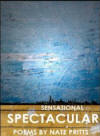Sensational Spectacular
Nate Pritts lives in a sealed chamber. At least, I think he does, or wishes he did. Whether the voice in his poems is his own or an invented persona is unclear, but the question is soon overwhelmed by the noisy glass cubicle of his poetic consciousness – things don’t hesitate to boom, explode, and self-destruct. The place simply simmers with internal threat. After all, volcanoes are exploding here, dinosaurs are waiting, lighting strikes, the roller coaster won’t stop, the wind won’t stop, violent floods of emotion assail him, and the light is dangerously perfect. But you only know it because he tells you so. You can’t see it. You can’t break through those glass barriers – no one can. Not the woman Pritts longs after with potent intensity, and not the nameless friends he apparently lives amongst.
Nate Pritts lives in a sealed chamber. At least, I think he does, or wishes he did. Whether the voice in his poems is his own or an invented persona is unclear, but the question is soon overwhelmed by the noisy glass cubicle of his poetic consciousness – things don’t hesitate to boom, explode, and self-destruct. The place simply simmers with internal threat. After all, volcanoes are exploding here, dinosaurs are waiting, lighting strikes, the roller coaster won’t stop, the wind won’t stop, violent floods of emotion assail him, and the light is dangerously perfect. But you only know it because he tells you so. You can’t see it. You can’t break through those glass barriers – no one can. Not the woman Pritts longs after with potent intensity, and not the nameless friends he apparently lives amongst.
Pritts’s poems are landscapes of bottled chaos: this is the eternal now he creates in his poems, where he wakes every day to a treadmill of relentless turbulence while the world continues to wend its determined way beyond his barriers, where he is not seen or thought of.
This one-way mirror effect lends both perspective and claustrophobia to Pritts’s precise, immaculately rendered work. His psyche seems to reel with exhaustion and yet with certain joy – to outward appearances, he seems a man stripped by circumstances and left bereft of anything save his frayed, twitching nerve-ends – yet Pritts’s voice is that of elation as well, of ebullience in the expressive powers of description itself:
my friend & I got ourselves trapped in individual-sized
prisons. We could no longer perform our secret handshake,
kept distant from each other by the unique quality of the bars.
The prisons themselves seemed to grow smaller as night
came on & then, with a blink, they were gone. We were ecstatic until,
in daylight, we realized the bars had formed snug to our bodies,
that we’d wear them always & unnoticeably.
A beautiful description there, one, which starts with implied threat, travels through a moment of glory, then introduces something unsettling. In fact, Pritts seems to revel in introducing an unsettling tone throughout his manuscript. He wants to impress you, to stay tough but to get through somehow, to find a space where longing and frank need appear touching and honest instead of plainly weak and naked. He can startle you with his closeness while simultaneously revealing the vague threat of danger we shelter in all our relationships, as in “Without a Net”:
all the different aspects of myself that I used to hold dear
are trapped in clear bubbles; somewhere, each one
is getting smashed open & what comes out comes out
shivering & afraid. The sunlight turns orange.
For your love, I’d cross from one mountain to another,
walking slow on the long rope bridge to your heart
& I wouldn’t turn back even if I saw you
trying to undo the knots that hold me up.
His deliberate, delicate vulnerability also reveals the way his narrator explores the fragmentation of personality. To Pritts, the self is not complete. It has all sorts of ways of expressing its varying facets, and refuses to be tamped down to just one “personality.” Pritts will acknowledge this explicitly in some places, but in others, it’s left to readers to discern what’s going on. For example, Pritts mentions a variety of “friends,” identifying them only by the name of a color, creating characters who might actually be shades of a single personality, one that is terrifyingly coalescing into a lonely whole. This interpretation perhaps assumes too much, but whether Pritts is talking about friendships with others or fragmentation within himself, he’s a master at delineating the shadow lands of despair, as in “Runaway Room”:
What I hate is when my friends & I
are all having a serious conversation
about appropriately serious subjects
when—out of nowhere—the floor of the room
rips itself out of the building & hurtles
into orbit above the Earth,
ccreating too vast a distance for us to bridge.
The poems in Sensational Spectacular are full of despair that whispers in one’s ear even as it prepares to launch a surprise napalm attack. It’s this finely keyed emotional intensity, sometimes soft-pedaled and sometimes surreal, that drives the lush simplicity of Pritts’s language, and makes reading this collection such a delicious experience.





